Apparent Authority: Analysis of Legal Principles and Case Studies
VerifiedAdded on 2023/01/19
|9
|2952
|48
Report
AI Summary
This report provides a comprehensive overview of apparent authority within the context of commercial law. It begins with an introduction to agency relationships, distinguishing between actual and apparent authority, and explaining how the principal is liable for acts of the agent. The report details the three types of authorities, with a focus on apparent authority. It explores how apparent authority affects third parties, the responsibilities of the principal, and the responses of courts to related issues. The report uses case law, such as Burnt Cotton and Rama Corp Ltd v Proved Tin and General Investments Ltd, to illustrate key concepts like estoppel. It also discusses the implications of apparent authority in business operations and contractual agreements, emphasizing the potential for misguidance and legal challenges. The report highlights the importance of clear guidelines, the role of the courts in addressing breaches, and the significance of understanding the relationships between agents, principals, and third parties.
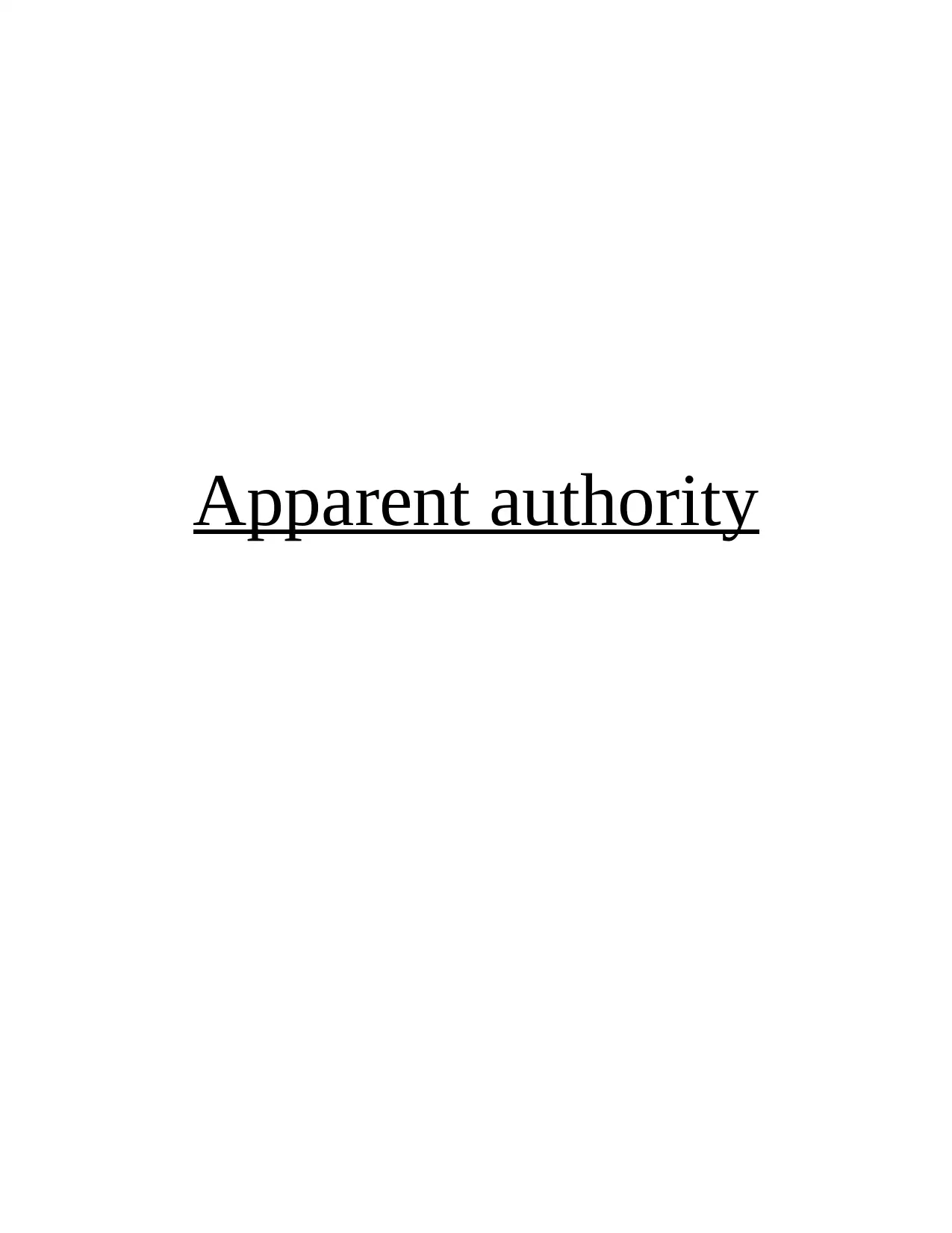
Apparent authority
Paraphrase This Document
Need a fresh take? Get an instant paraphrase of this document with our AI Paraphraser
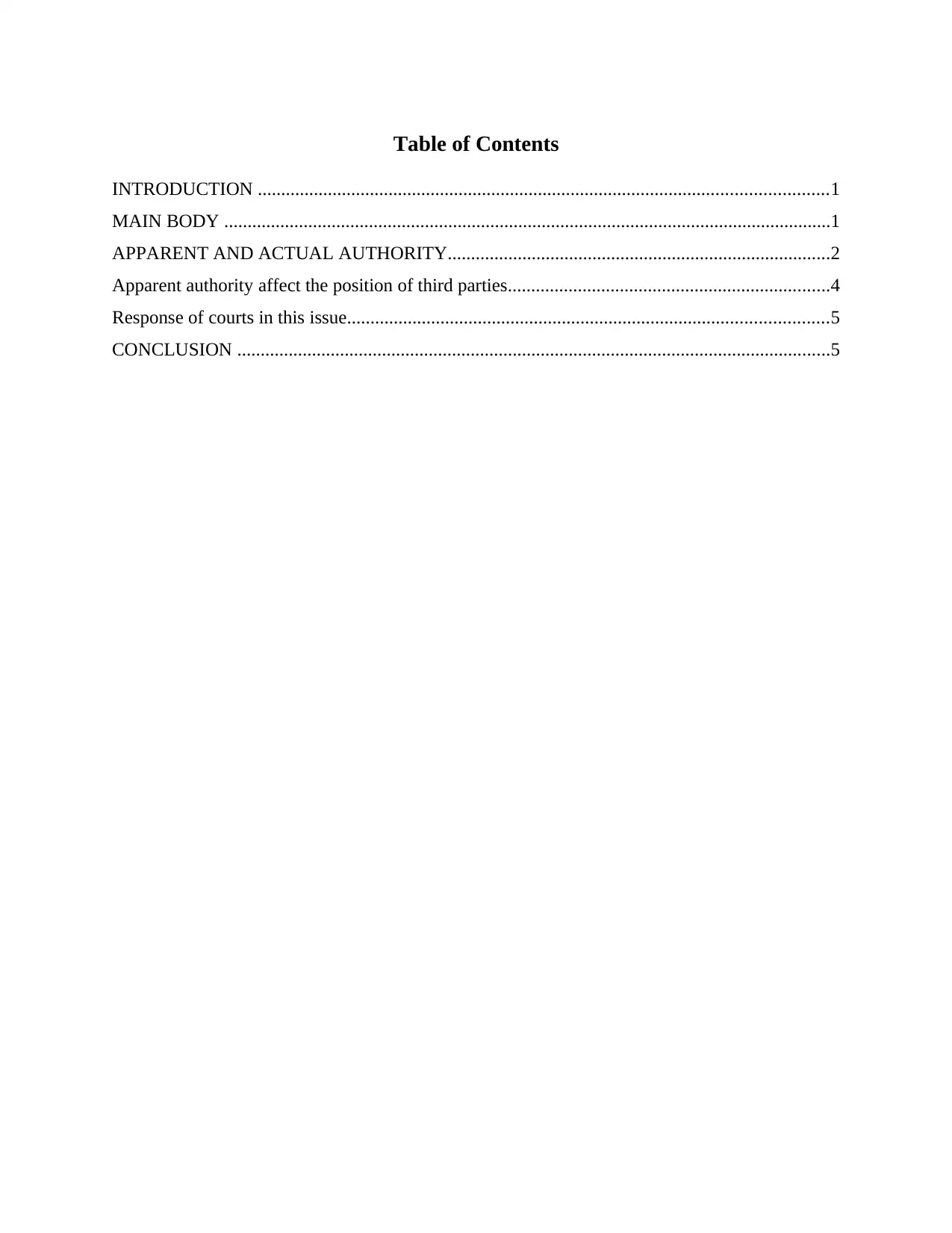
Table of Contents
INTRODUCTION ..........................................................................................................................1
MAIN BODY ..................................................................................................................................1
APPARENT AND ACTUAL AUTHORITY..................................................................................2
Apparent authority affect the position of third parties.....................................................................4
Response of courts in this issue.......................................................................................................5
CONCLUSION ...............................................................................................................................5
INTRODUCTION ..........................................................................................................................1
MAIN BODY ..................................................................................................................................1
APPARENT AND ACTUAL AUTHORITY..................................................................................2
Apparent authority affect the position of third parties.....................................................................4
Response of courts in this issue.......................................................................................................5
CONCLUSION ...............................................................................................................................5
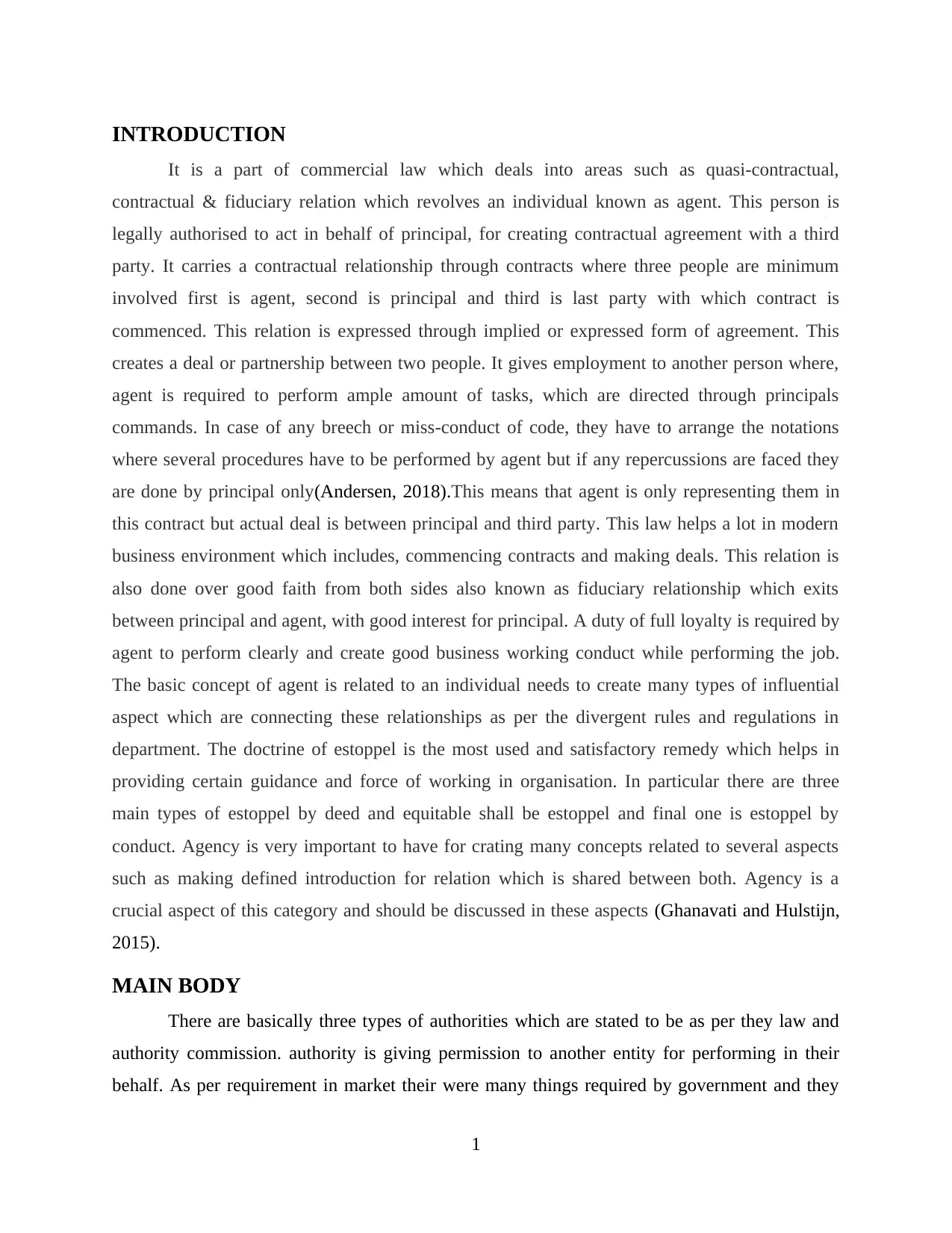
INTRODUCTION
It is a part of commercial law which deals into areas such as quasi-contractual,
contractual & fiduciary relation which revolves an individual known as agent. This person is
legally authorised to act in behalf of principal, for creating contractual agreement with a third
party. It carries a contractual relationship through contracts where three people are minimum
involved first is agent, second is principal and third is last party with which contract is
commenced. This relation is expressed through implied or expressed form of agreement. This
creates a deal or partnership between two people. It gives employment to another person where,
agent is required to perform ample amount of tasks, which are directed through principals
commands. In case of any breech or miss-conduct of code, they have to arrange the notations
where several procedures have to be performed by agent but if any repercussions are faced they
are done by principal only(Andersen, 2018).This means that agent is only representing them in
this contract but actual deal is between principal and third party. This law helps a lot in modern
business environment which includes, commencing contracts and making deals. This relation is
also done over good faith from both sides also known as fiduciary relationship which exits
between principal and agent, with good interest for principal. A duty of full loyalty is required by
agent to perform clearly and create good business working conduct while performing the job.
The basic concept of agent is related to an individual needs to create many types of influential
aspect which are connecting these relationships as per the divergent rules and regulations in
department. The doctrine of estoppel is the most used and satisfactory remedy which helps in
providing certain guidance and force of working in organisation. In particular there are three
main types of estoppel by deed and equitable shall be estoppel and final one is estoppel by
conduct. Agency is very important to have for crating many concepts related to several aspects
such as making defined introduction for relation which is shared between both. Agency is a
crucial aspect of this category and should be discussed in these aspects (Ghanavati and Hulstijn,
2015).
MAIN BODY
There are basically three types of authorities which are stated to be as per they law and
authority commission. authority is giving permission to another entity for performing in their
behalf. As per requirement in market their were many things required by government and they
1
It is a part of commercial law which deals into areas such as quasi-contractual,
contractual & fiduciary relation which revolves an individual known as agent. This person is
legally authorised to act in behalf of principal, for creating contractual agreement with a third
party. It carries a contractual relationship through contracts where three people are minimum
involved first is agent, second is principal and third is last party with which contract is
commenced. This relation is expressed through implied or expressed form of agreement. This
creates a deal or partnership between two people. It gives employment to another person where,
agent is required to perform ample amount of tasks, which are directed through principals
commands. In case of any breech or miss-conduct of code, they have to arrange the notations
where several procedures have to be performed by agent but if any repercussions are faced they
are done by principal only(Andersen, 2018).This means that agent is only representing them in
this contract but actual deal is between principal and third party. This law helps a lot in modern
business environment which includes, commencing contracts and making deals. This relation is
also done over good faith from both sides also known as fiduciary relationship which exits
between principal and agent, with good interest for principal. A duty of full loyalty is required by
agent to perform clearly and create good business working conduct while performing the job.
The basic concept of agent is related to an individual needs to create many types of influential
aspect which are connecting these relationships as per the divergent rules and regulations in
department. The doctrine of estoppel is the most used and satisfactory remedy which helps in
providing certain guidance and force of working in organisation. In particular there are three
main types of estoppel by deed and equitable shall be estoppel and final one is estoppel by
conduct. Agency is very important to have for crating many concepts related to several aspects
such as making defined introduction for relation which is shared between both. Agency is a
crucial aspect of this category and should be discussed in these aspects (Ghanavati and Hulstijn,
2015).
MAIN BODY
There are basically three types of authorities which are stated to be as per they law and
authority commission. authority is giving permission to another entity for performing in their
behalf. As per requirement in market their were many things required by government and they
1
⊘ This is a preview!⊘
Do you want full access?
Subscribe today to unlock all pages.

Trusted by 1+ million students worldwide
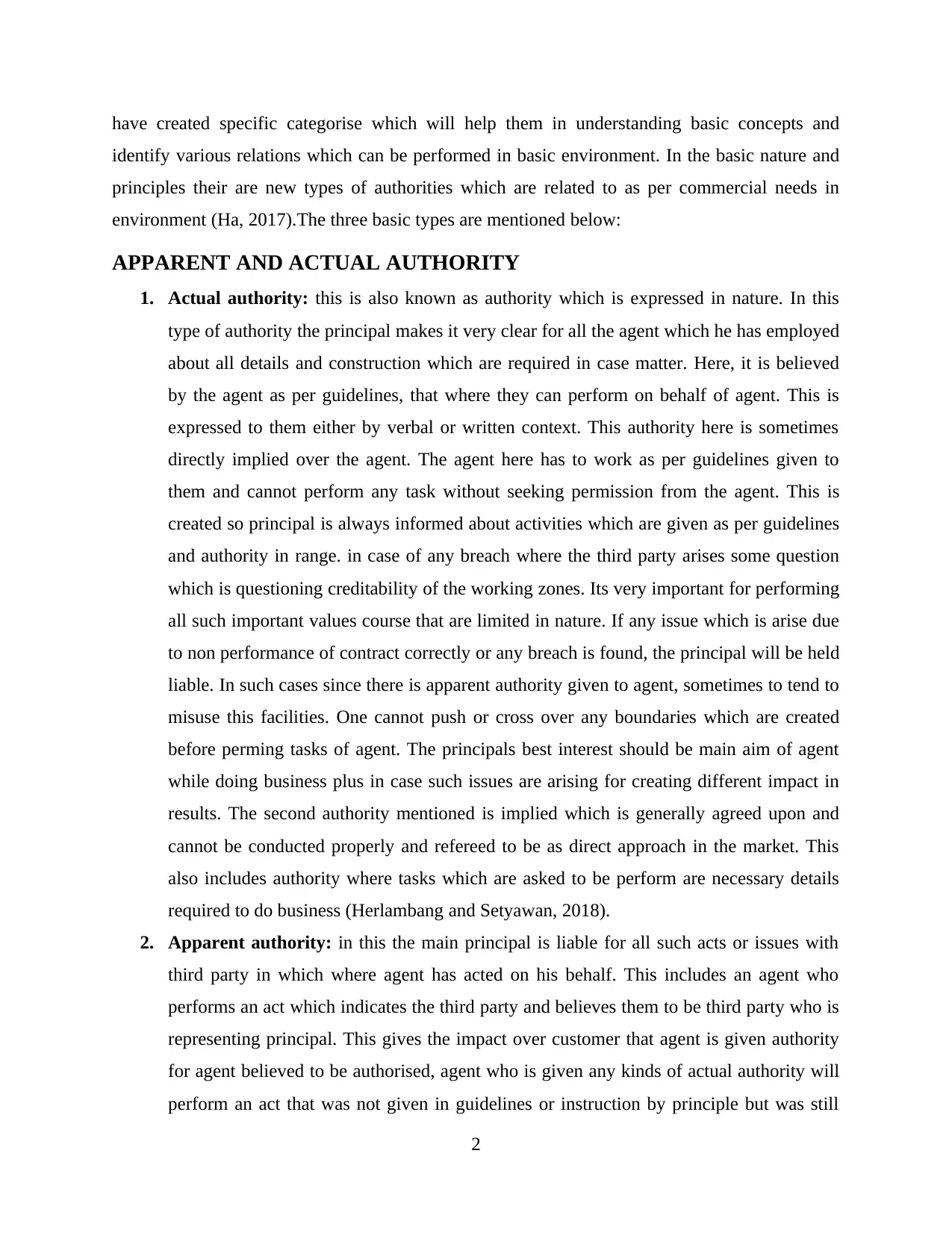
have created specific categorise which will help them in understanding basic concepts and
identify various relations which can be performed in basic environment. In the basic nature and
principles their are new types of authorities which are related to as per commercial needs in
environment (Ha, 2017).The three basic types are mentioned below:
APPARENT AND ACTUAL AUTHORITY
1. Actual authority: this is also known as authority which is expressed in nature. In this
type of authority the principal makes it very clear for all the agent which he has employed
about all details and construction which are required in case matter. Here, it is believed
by the agent as per guidelines, that where they can perform on behalf of agent. This is
expressed to them either by verbal or written context. This authority here is sometimes
directly implied over the agent. The agent here has to work as per guidelines given to
them and cannot perform any task without seeking permission from the agent. This is
created so principal is always informed about activities which are given as per guidelines
and authority in range. in case of any breach where the third party arises some question
which is questioning creditability of the working zones. Its very important for performing
all such important values course that are limited in nature. If any issue which is arise due
to non performance of contract correctly or any breach is found, the principal will be held
liable. In such cases since there is apparent authority given to agent, sometimes to tend to
misuse this facilities. One cannot push or cross over any boundaries which are created
before perming tasks of agent. The principals best interest should be main aim of agent
while doing business plus in case such issues are arising for creating different impact in
results. The second authority mentioned is implied which is generally agreed upon and
cannot be conducted properly and refereed to be as direct approach in the market. This
also includes authority where tasks which are asked to be perform are necessary details
required to do business (Herlambang and Setyawan, 2018).
2. Apparent authority: in this the main principal is liable for all such acts or issues with
third party in which where agent has acted on his behalf. This includes an agent who
performs an act which indicates the third party and believes them to be third party who is
representing principal. This gives the impact over customer that agent is given authority
for agent believed to be authorised, agent who is given any kinds of actual authority will
perform an act that was not given in guidelines or instruction by principle but was still
2
identify various relations which can be performed in basic environment. In the basic nature and
principles their are new types of authorities which are related to as per commercial needs in
environment (Ha, 2017).The three basic types are mentioned below:
APPARENT AND ACTUAL AUTHORITY
1. Actual authority: this is also known as authority which is expressed in nature. In this
type of authority the principal makes it very clear for all the agent which he has employed
about all details and construction which are required in case matter. Here, it is believed
by the agent as per guidelines, that where they can perform on behalf of agent. This is
expressed to them either by verbal or written context. This authority here is sometimes
directly implied over the agent. The agent here has to work as per guidelines given to
them and cannot perform any task without seeking permission from the agent. This is
created so principal is always informed about activities which are given as per guidelines
and authority in range. in case of any breach where the third party arises some question
which is questioning creditability of the working zones. Its very important for performing
all such important values course that are limited in nature. If any issue which is arise due
to non performance of contract correctly or any breach is found, the principal will be held
liable. In such cases since there is apparent authority given to agent, sometimes to tend to
misuse this facilities. One cannot push or cross over any boundaries which are created
before perming tasks of agent. The principals best interest should be main aim of agent
while doing business plus in case such issues are arising for creating different impact in
results. The second authority mentioned is implied which is generally agreed upon and
cannot be conducted properly and refereed to be as direct approach in the market. This
also includes authority where tasks which are asked to be perform are necessary details
required to do business (Herlambang and Setyawan, 2018).
2. Apparent authority: in this the main principal is liable for all such acts or issues with
third party in which where agent has acted on his behalf. This includes an agent who
performs an act which indicates the third party and believes them to be third party who is
representing principal. This gives the impact over customer that agent is given authority
for agent believed to be authorised, agent who is given any kinds of actual authority will
perform an act that was not given in guidelines or instruction by principle but was still
2
Paraphrase This Document
Need a fresh take? Get an instant paraphrase of this document with our AI Paraphraser
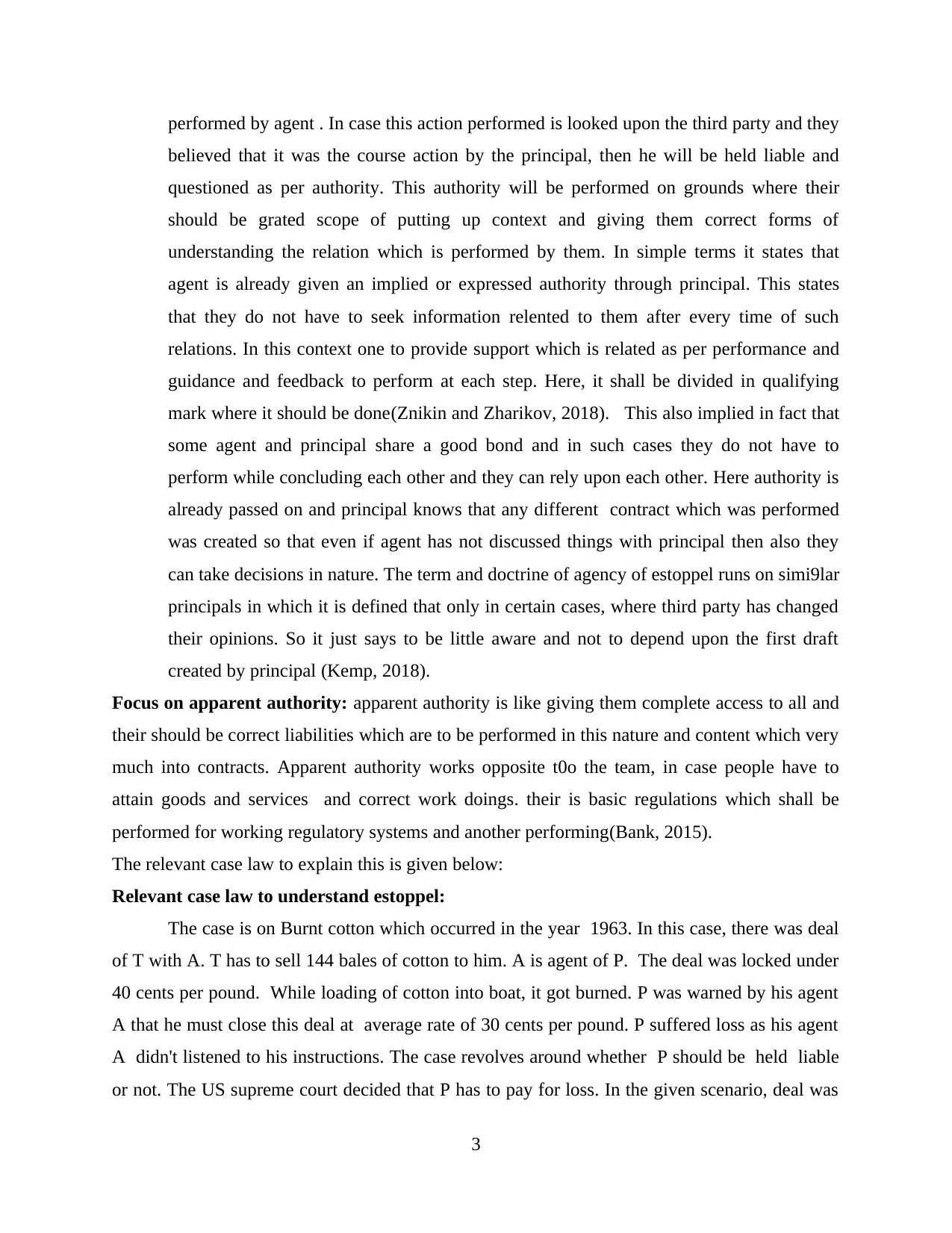
performed by agent . In case this action performed is looked upon the third party and they
believed that it was the course action by the principal, then he will be held liable and
questioned as per authority. This authority will be performed on grounds where their
should be grated scope of putting up context and giving them correct forms of
understanding the relation which is performed by them. In simple terms it states that
agent is already given an implied or expressed authority through principal. This states
that they do not have to seek information relented to them after every time of such
relations. In this context one to provide support which is related as per performance and
guidance and feedback to perform at each step. Here, it shall be divided in qualifying
mark where it should be done(Znikin and Zharikov, 2018). This also implied in fact that
some agent and principal share a good bond and in such cases they do not have to
perform while concluding each other and they can rely upon each other. Here authority is
already passed on and principal knows that any different contract which was performed
was created so that even if agent has not discussed things with principal then also they
can take decisions in nature. The term and doctrine of agency of estoppel runs on simi9lar
principals in which it is defined that only in certain cases, where third party has changed
their opinions. So it just says to be little aware and not to depend upon the first draft
created by principal (Kemp, 2018).
Focus on apparent authority: apparent authority is like giving them complete access to all and
their should be correct liabilities which are to be performed in this nature and content which very
much into contracts. Apparent authority works opposite t0o the team, in case people have to
attain goods and services and correct work doings. their is basic regulations which shall be
performed for working regulatory systems and another performing(Bank, 2015).
The relevant case law to explain this is given below:
Relevant case law to understand estoppel:
The case is on Burnt cotton which occurred in the year 1963. In this case, there was deal
of T with A. T has to sell 144 bales of cotton to him. A is agent of P. The deal was locked under
40 cents per pound. While loading of cotton into boat, it got burned. P was warned by his agent
A that he must close this deal at average rate of 30 cents per pound. P suffered loss as his agent
A didn't listened to his instructions. The case revolves around whether P should be held liable
or not. The US supreme court decided that P has to pay for loss. In the given scenario, deal was
3
believed that it was the course action by the principal, then he will be held liable and
questioned as per authority. This authority will be performed on grounds where their
should be grated scope of putting up context and giving them correct forms of
understanding the relation which is performed by them. In simple terms it states that
agent is already given an implied or expressed authority through principal. This states
that they do not have to seek information relented to them after every time of such
relations. In this context one to provide support which is related as per performance and
guidance and feedback to perform at each step. Here, it shall be divided in qualifying
mark where it should be done(Znikin and Zharikov, 2018). This also implied in fact that
some agent and principal share a good bond and in such cases they do not have to
perform while concluding each other and they can rely upon each other. Here authority is
already passed on and principal knows that any different contract which was performed
was created so that even if agent has not discussed things with principal then also they
can take decisions in nature. The term and doctrine of agency of estoppel runs on simi9lar
principals in which it is defined that only in certain cases, where third party has changed
their opinions. So it just says to be little aware and not to depend upon the first draft
created by principal (Kemp, 2018).
Focus on apparent authority: apparent authority is like giving them complete access to all and
their should be correct liabilities which are to be performed in this nature and content which very
much into contracts. Apparent authority works opposite t0o the team, in case people have to
attain goods and services and correct work doings. their is basic regulations which shall be
performed for working regulatory systems and another performing(Bank, 2015).
The relevant case law to explain this is given below:
Relevant case law to understand estoppel:
The case is on Burnt cotton which occurred in the year 1963. In this case, there was deal
of T with A. T has to sell 144 bales of cotton to him. A is agent of P. The deal was locked under
40 cents per pound. While loading of cotton into boat, it got burned. P was warned by his agent
A that he must close this deal at average rate of 30 cents per pound. P suffered loss as his agent
A didn't listened to his instructions. The case revolves around whether P should be held liable
or not. The US supreme court decided that P has to pay for loss. In the given scenario, deal was
3
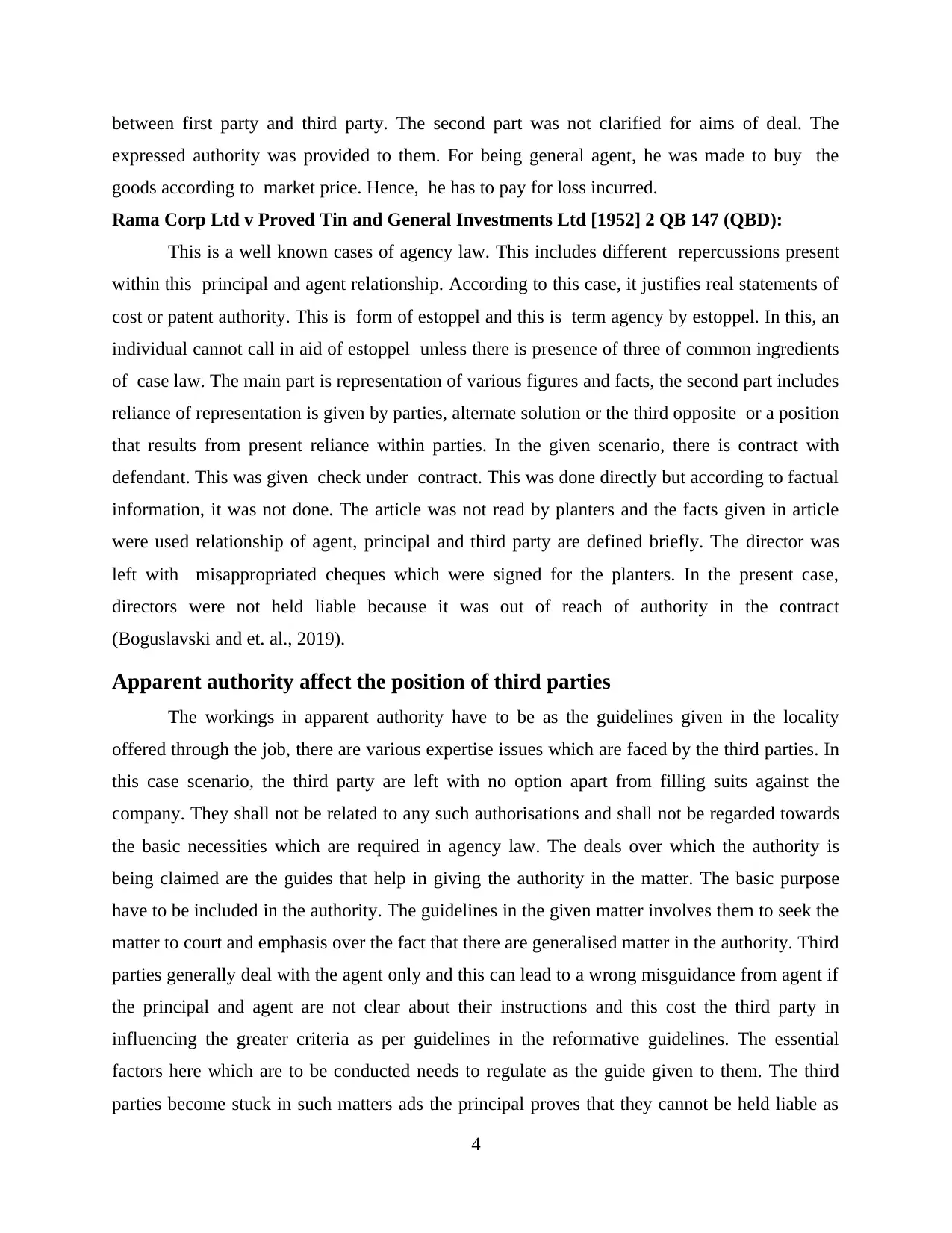
between first party and third party. The second part was not clarified for aims of deal. The
expressed authority was provided to them. For being general agent, he was made to buy the
goods according to market price. Hence, he has to pay for loss incurred.
Rama Corp Ltd v Proved Tin and General Investments Ltd [1952] 2 QB 147 (QBD):
This is a well known cases of agency law. This includes different repercussions present
within this principal and agent relationship. According to this case, it justifies real statements of
cost or patent authority. This is form of estoppel and this is term agency by estoppel. In this, an
individual cannot call in aid of estoppel unless there is presence of three of common ingredients
of case law. The main part is representation of various figures and facts, the second part includes
reliance of representation is given by parties, alternate solution or the third opposite or a position
that results from present reliance within parties. In the given scenario, there is contract with
defendant. This was given check under contract. This was done directly but according to factual
information, it was not done. The article was not read by planters and the facts given in article
were used relationship of agent, principal and third party are defined briefly. The director was
left with misappropriated cheques which were signed for the planters. In the present case,
directors were not held liable because it was out of reach of authority in the contract
(Boguslavski and et. al., 2019).
Apparent authority affect the position of third parties
The workings in apparent authority have to be as the guidelines given in the locality
offered through the job, there are various expertise issues which are faced by the third parties. In
this case scenario, the third party are left with no option apart from filling suits against the
company. They shall not be related to any such authorisations and shall not be regarded towards
the basic necessities which are required in agency law. The deals over which the authority is
being claimed are the guides that help in giving the authority in the matter. The basic purpose
have to be included in the authority. The guidelines in the given matter involves them to seek the
matter to court and emphasis over the fact that there are generalised matter in the authority. Third
parties generally deal with the agent only and this can lead to a wrong misguidance from agent if
the principal and agent are not clear about their instructions and this cost the third party in
influencing the greater criteria as per guidelines in the reformative guidelines. The essential
factors here which are to be conducted needs to regulate as the guide given to them. The third
parties become stuck in such matters ads the principal proves that they cannot be held liable as
4
expressed authority was provided to them. For being general agent, he was made to buy the
goods according to market price. Hence, he has to pay for loss incurred.
Rama Corp Ltd v Proved Tin and General Investments Ltd [1952] 2 QB 147 (QBD):
This is a well known cases of agency law. This includes different repercussions present
within this principal and agent relationship. According to this case, it justifies real statements of
cost or patent authority. This is form of estoppel and this is term agency by estoppel. In this, an
individual cannot call in aid of estoppel unless there is presence of three of common ingredients
of case law. The main part is representation of various figures and facts, the second part includes
reliance of representation is given by parties, alternate solution or the third opposite or a position
that results from present reliance within parties. In the given scenario, there is contract with
defendant. This was given check under contract. This was done directly but according to factual
information, it was not done. The article was not read by planters and the facts given in article
were used relationship of agent, principal and third party are defined briefly. The director was
left with misappropriated cheques which were signed for the planters. In the present case,
directors were not held liable because it was out of reach of authority in the contract
(Boguslavski and et. al., 2019).
Apparent authority affect the position of third parties
The workings in apparent authority have to be as the guidelines given in the locality
offered through the job, there are various expertise issues which are faced by the third parties. In
this case scenario, the third party are left with no option apart from filling suits against the
company. They shall not be related to any such authorisations and shall not be regarded towards
the basic necessities which are required in agency law. The deals over which the authority is
being claimed are the guides that help in giving the authority in the matter. The basic purpose
have to be included in the authority. The guidelines in the given matter involves them to seek the
matter to court and emphasis over the fact that there are generalised matter in the authority. Third
parties generally deal with the agent only and this can lead to a wrong misguidance from agent if
the principal and agent are not clear about their instructions and this cost the third party in
influencing the greater criteria as per guidelines in the reformative guidelines. The essential
factors here which are to be conducted needs to regulate as the guide given to them. The third
parties become stuck in such matters ads the principal proves that they cannot be held liable as
4
⊘ This is a preview!⊘
Do you want full access?
Subscribe today to unlock all pages.

Trusted by 1+ million students worldwide
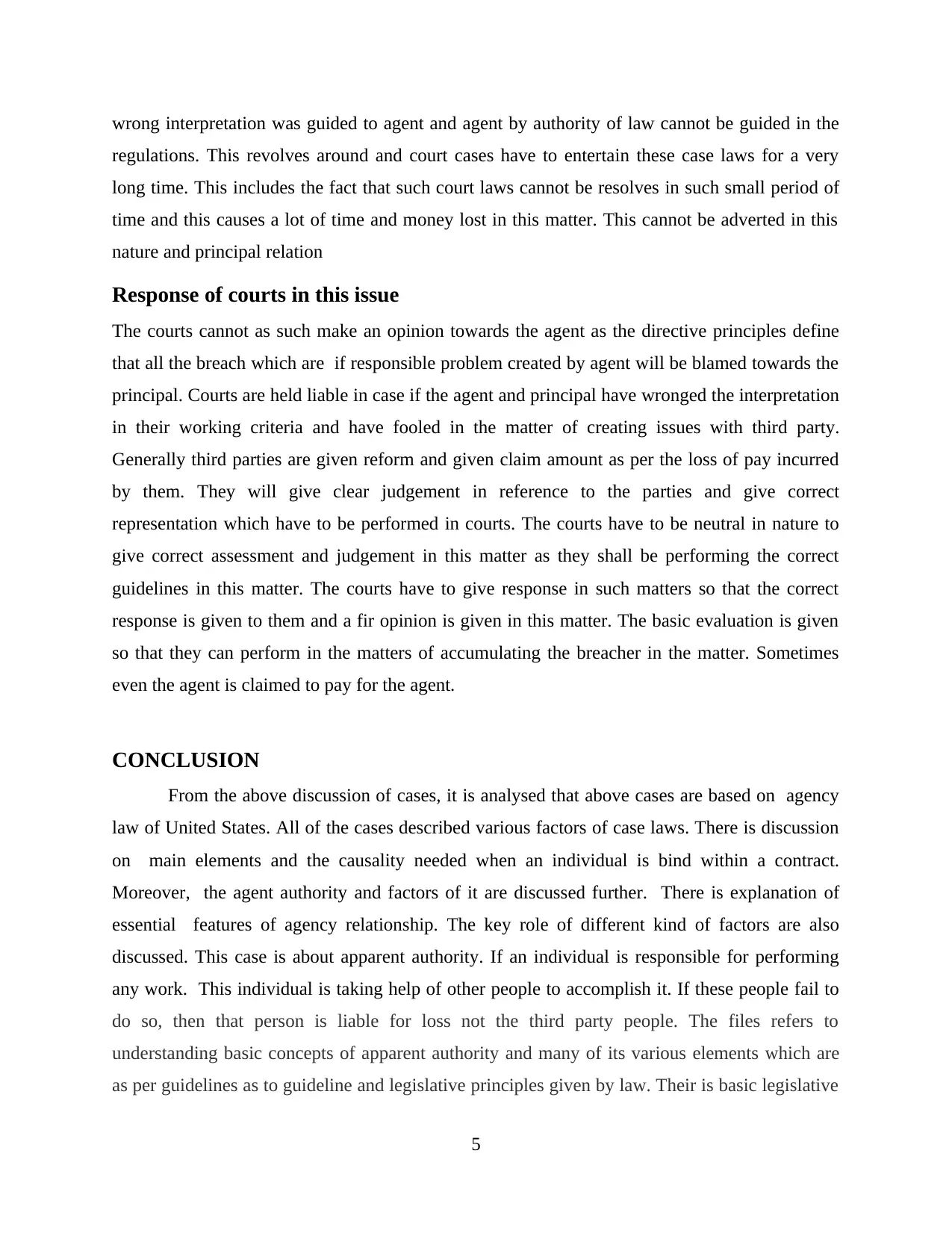
wrong interpretation was guided to agent and agent by authority of law cannot be guided in the
regulations. This revolves around and court cases have to entertain these case laws for a very
long time. This includes the fact that such court laws cannot be resolves in such small period of
time and this causes a lot of time and money lost in this matter. This cannot be adverted in this
nature and principal relation
Response of courts in this issue
The courts cannot as such make an opinion towards the agent as the directive principles define
that all the breach which are if responsible problem created by agent will be blamed towards the
principal. Courts are held liable in case if the agent and principal have wronged the interpretation
in their working criteria and have fooled in the matter of creating issues with third party.
Generally third parties are given reform and given claim amount as per the loss of pay incurred
by them. They will give clear judgement in reference to the parties and give correct
representation which have to be performed in courts. The courts have to be neutral in nature to
give correct assessment and judgement in this matter as they shall be performing the correct
guidelines in this matter. The courts have to give response in such matters so that the correct
response is given to them and a fir opinion is given in this matter. The basic evaluation is given
so that they can perform in the matters of accumulating the breacher in the matter. Sometimes
even the agent is claimed to pay for the agent.
CONCLUSION
From the above discussion of cases, it is analysed that above cases are based on agency
law of United States. All of the cases described various factors of case laws. There is discussion
on main elements and the causality needed when an individual is bind within a contract.
Moreover, the agent authority and factors of it are discussed further. There is explanation of
essential features of agency relationship. The key role of different kind of factors are also
discussed. This case is about apparent authority. If an individual is responsible for performing
any work. This individual is taking help of other people to accomplish it. If these people fail to
do so, then that person is liable for loss not the third party people. The files refers to
understanding basic concepts of apparent authority and many of its various elements which are
as per guidelines as to guideline and legislative principles given by law. Their is basic legislative
5
regulations. This revolves around and court cases have to entertain these case laws for a very
long time. This includes the fact that such court laws cannot be resolves in such small period of
time and this causes a lot of time and money lost in this matter. This cannot be adverted in this
nature and principal relation
Response of courts in this issue
The courts cannot as such make an opinion towards the agent as the directive principles define
that all the breach which are if responsible problem created by agent will be blamed towards the
principal. Courts are held liable in case if the agent and principal have wronged the interpretation
in their working criteria and have fooled in the matter of creating issues with third party.
Generally third parties are given reform and given claim amount as per the loss of pay incurred
by them. They will give clear judgement in reference to the parties and give correct
representation which have to be performed in courts. The courts have to be neutral in nature to
give correct assessment and judgement in this matter as they shall be performing the correct
guidelines in this matter. The courts have to give response in such matters so that the correct
response is given to them and a fir opinion is given in this matter. The basic evaluation is given
so that they can perform in the matters of accumulating the breacher in the matter. Sometimes
even the agent is claimed to pay for the agent.
CONCLUSION
From the above discussion of cases, it is analysed that above cases are based on agency
law of United States. All of the cases described various factors of case laws. There is discussion
on main elements and the causality needed when an individual is bind within a contract.
Moreover, the agent authority and factors of it are discussed further. There is explanation of
essential features of agency relationship. The key role of different kind of factors are also
discussed. This case is about apparent authority. If an individual is responsible for performing
any work. This individual is taking help of other people to accomplish it. If these people fail to
do so, then that person is liable for loss not the third party people. The files refers to
understanding basic concepts of apparent authority and many of its various elements which are
as per guidelines as to guideline and legislative principles given by law. Their is basic legislative
5
Paraphrase This Document
Need a fresh take? Get an instant paraphrase of this document with our AI Paraphraser
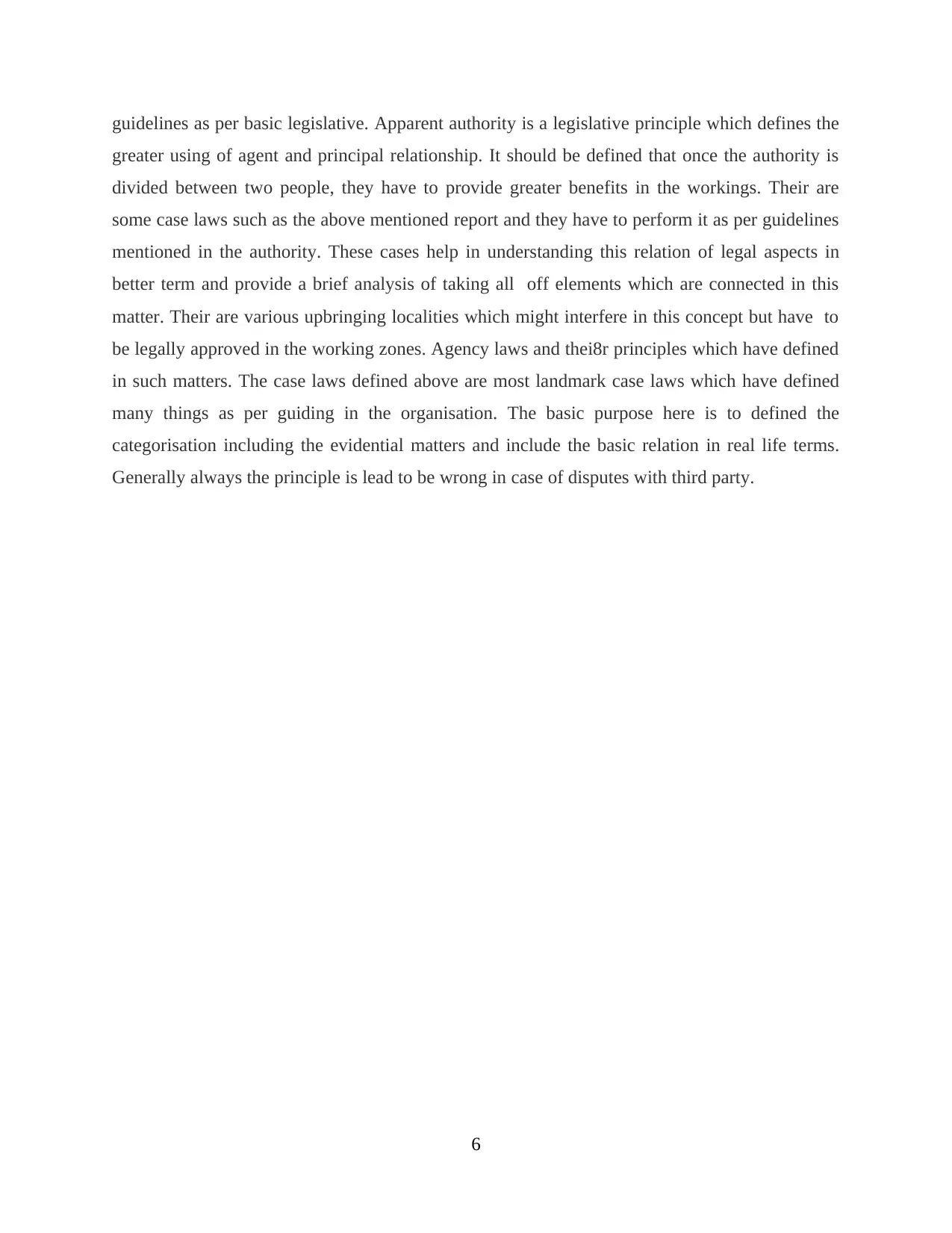
guidelines as per basic legislative. Apparent authority is a legislative principle which defines the
greater using of agent and principal relationship. It should be defined that once the authority is
divided between two people, they have to provide greater benefits in the workings. Their are
some case laws such as the above mentioned report and they have to perform it as per guidelines
mentioned in the authority. These cases help in understanding this relation of legal aspects in
better term and provide a brief analysis of taking all off elements which are connected in this
matter. Their are various upbringing localities which might interfere in this concept but have to
be legally approved in the working zones. Agency laws and thei8r principles which have defined
in such matters. The case laws defined above are most landmark case laws which have defined
many things as per guiding in the organisation. The basic purpose here is to defined the
categorisation including the evidential matters and include the basic relation in real life terms.
Generally always the principle is lead to be wrong in case of disputes with third party.
6
greater using of agent and principal relationship. It should be defined that once the authority is
divided between two people, they have to provide greater benefits in the workings. Their are
some case laws such as the above mentioned report and they have to perform it as per guidelines
mentioned in the authority. These cases help in understanding this relation of legal aspects in
better term and provide a brief analysis of taking all off elements which are connected in this
matter. Their are various upbringing localities which might interfere in this concept but have to
be legally approved in the working zones. Agency laws and thei8r principles which have defined
in such matters. The case laws defined above are most landmark case laws which have defined
many things as per guiding in the organisation. The basic purpose here is to defined the
categorisation including the evidential matters and include the basic relation in real life terms.
Generally always the principle is lead to be wrong in case of disputes with third party.
6
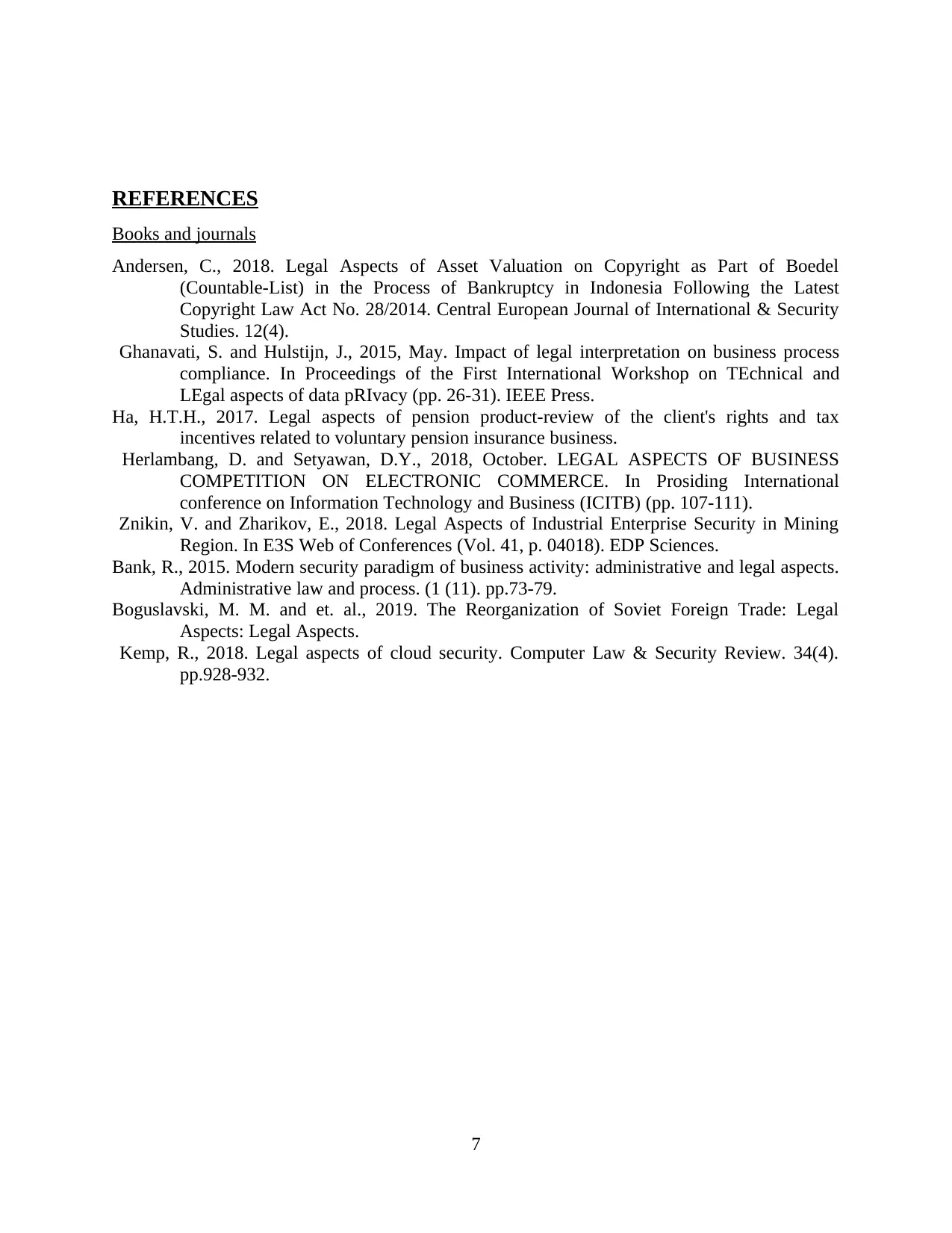
REFERENCES
Books and journals
Andersen, C., 2018. Legal Aspects of Asset Valuation on Copyright as Part of Boedel
(Countable-List) in the Process of Bankruptcy in Indonesia Following the Latest
Copyright Law Act No. 28/2014. Central European Journal of International & Security
Studies. 12(4).
Ghanavati, S. and Hulstijn, J., 2015, May. Impact of legal interpretation on business process
compliance. In Proceedings of the First International Workshop on TEchnical and
LEgal aspects of data pRIvacy (pp. 26-31). IEEE Press.
Ha, H.T.H., 2017. Legal aspects of pension product-review of the client's rights and tax
incentives related to voluntary pension insurance business.
Herlambang, D. and Setyawan, D.Y., 2018, October. LEGAL ASPECTS OF BUSINESS
COMPETITION ON ELECTRONIC COMMERCE. In Prosiding International
conference on Information Technology and Business (ICITB) (pp. 107-111).
Znikin, V. and Zharikov, E., 2018. Legal Aspects of Industrial Enterprise Security in Mining
Region. In E3S Web of Conferences (Vol. 41, p. 04018). EDP Sciences.
Bank, R., 2015. Modern security paradigm of business activity: administrative and legal aspects.
Administrative law and process. (1 (11). pp.73-79.
Boguslavski, M. M. and et. al., 2019. The Reorganization of Soviet Foreign Trade: Legal
Aspects: Legal Aspects.
Kemp, R., 2018. Legal aspects of cloud security. Computer Law & Security Review. 34(4).
pp.928-932.
7
Books and journals
Andersen, C., 2018. Legal Aspects of Asset Valuation on Copyright as Part of Boedel
(Countable-List) in the Process of Bankruptcy in Indonesia Following the Latest
Copyright Law Act No. 28/2014. Central European Journal of International & Security
Studies. 12(4).
Ghanavati, S. and Hulstijn, J., 2015, May. Impact of legal interpretation on business process
compliance. In Proceedings of the First International Workshop on TEchnical and
LEgal aspects of data pRIvacy (pp. 26-31). IEEE Press.
Ha, H.T.H., 2017. Legal aspects of pension product-review of the client's rights and tax
incentives related to voluntary pension insurance business.
Herlambang, D. and Setyawan, D.Y., 2018, October. LEGAL ASPECTS OF BUSINESS
COMPETITION ON ELECTRONIC COMMERCE. In Prosiding International
conference on Information Technology and Business (ICITB) (pp. 107-111).
Znikin, V. and Zharikov, E., 2018. Legal Aspects of Industrial Enterprise Security in Mining
Region. In E3S Web of Conferences (Vol. 41, p. 04018). EDP Sciences.
Bank, R., 2015. Modern security paradigm of business activity: administrative and legal aspects.
Administrative law and process. (1 (11). pp.73-79.
Boguslavski, M. M. and et. al., 2019. The Reorganization of Soviet Foreign Trade: Legal
Aspects: Legal Aspects.
Kemp, R., 2018. Legal aspects of cloud security. Computer Law & Security Review. 34(4).
pp.928-932.
7
⊘ This is a preview!⊘
Do you want full access?
Subscribe today to unlock all pages.

Trusted by 1+ million students worldwide
1 out of 9
Related Documents
Your All-in-One AI-Powered Toolkit for Academic Success.
+13062052269
info@desklib.com
Available 24*7 on WhatsApp / Email
![[object Object]](/_next/static/media/star-bottom.7253800d.svg)
Unlock your academic potential
Copyright © 2020–2026 A2Z Services. All Rights Reserved. Developed and managed by ZUCOL.





